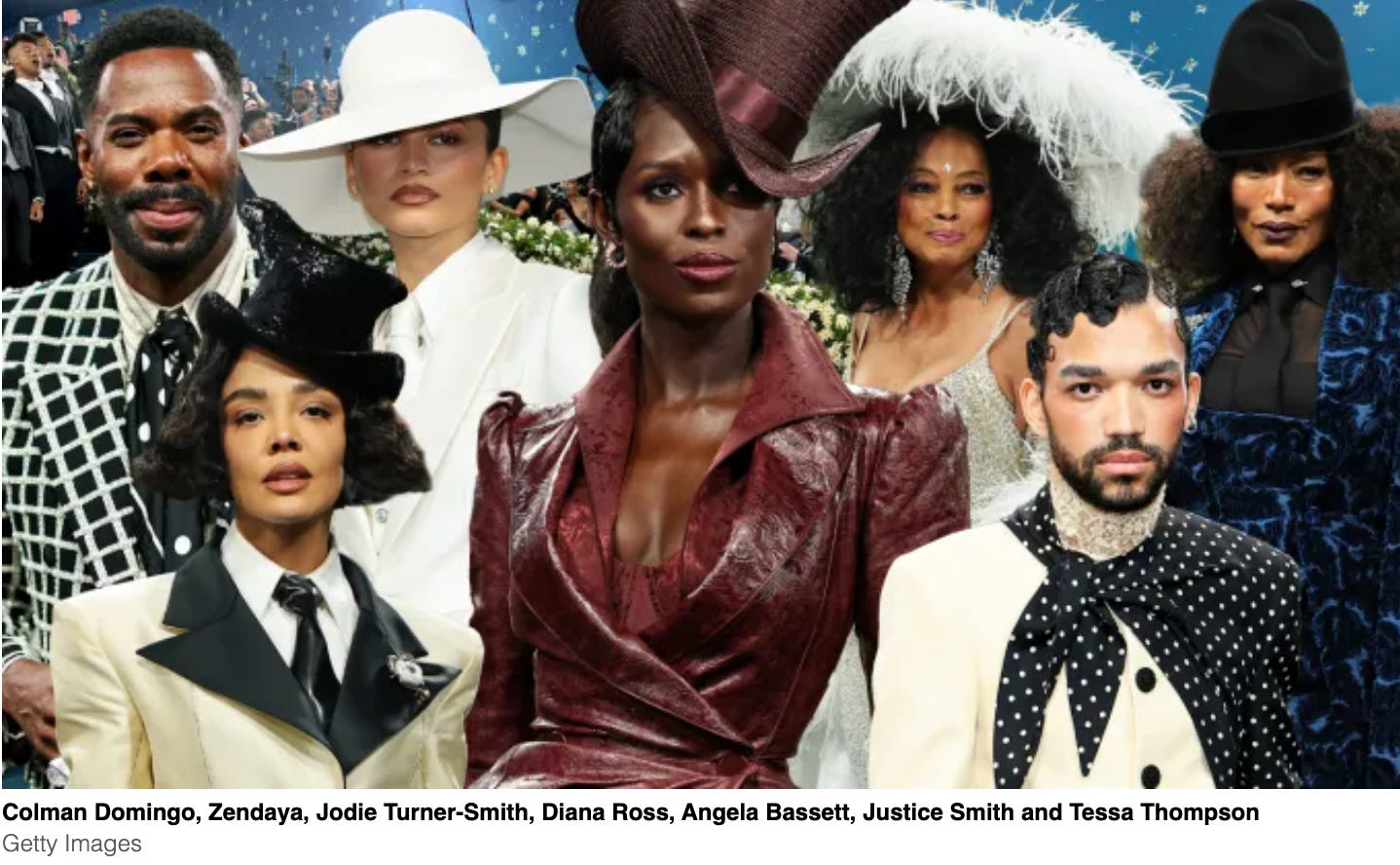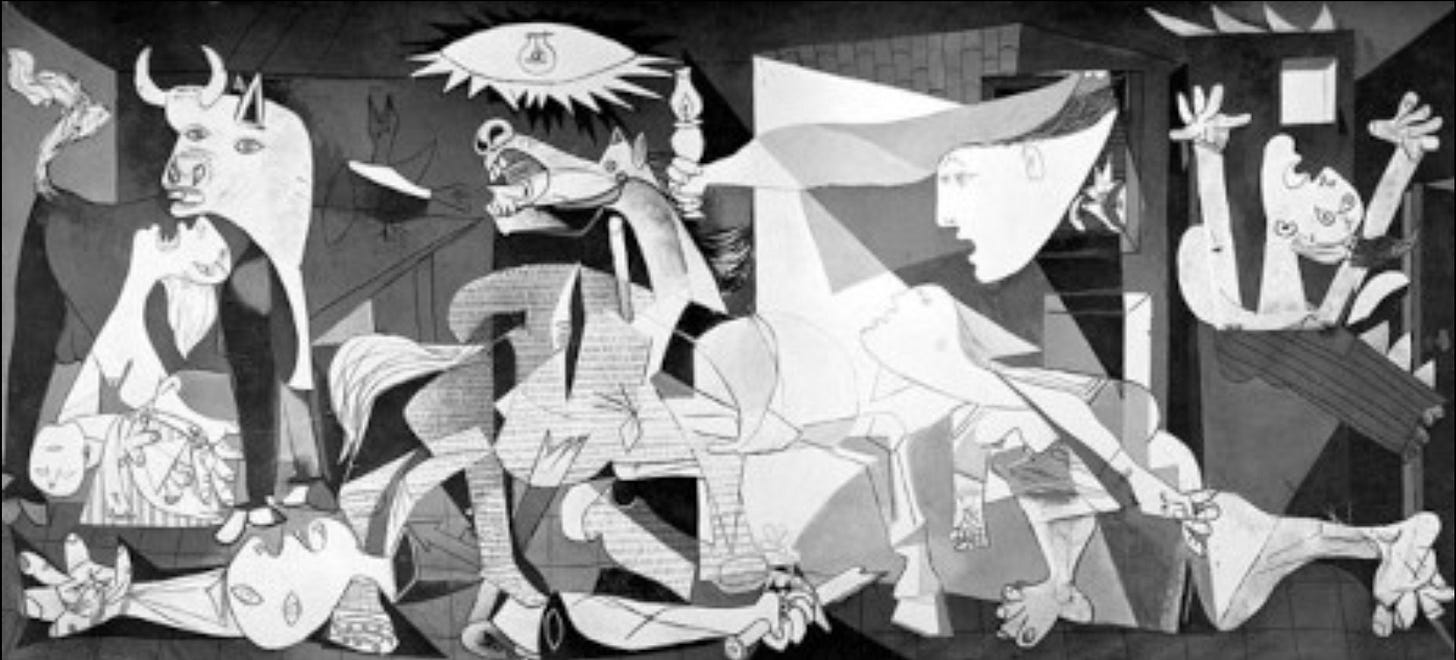You Can’t Police the Imagination 🚔💭
They criminalize bodies. Culture reclaims them. A global look at art as resistance in the face of rising authoritarianism.
Hello, my beautiful people!
If you were out in the streets this weekend, whether holding a sign in protest or enjoying Father’s Day brunch, I hope that you all made it to Monday safely. It’s also Juneteenth week, so let me say Happy Juneteenth in advance. May someone you know be on the grill!
I've been absent, and that is due to some news I'm elated to share. In a couple of months, I'll be trading in my Google badge and leaving DC to begin a new chapter. After a year of essays, interviews, and school visits, I'm thrilled to announce my transition into an MBA student at Columbia Business School, where, as a Robert Smith Fellow, I’ll be studying ethical AI.
The gravity of this transition hasn't fully hit me. It could be the surreal feeling of becoming a student again and relocating to a new city. Perhaps I didn't know how to fully celebrate such a milestone, especially as Columbia has faced heavy criticism this year. Or it could be that the world feels like it's unraveling, and to me, it's strange to talk about personal wins while so much is being lost.
But this is me, taking my moment in the sun.
The Tension Between State and Culture
Under the current administration, we are witnessing the rollback of human rights, the criminalization of immigration with illegal ICE raids, and a disturbing push toward early 20th-century politics with the most unmeritorious "meritocracy" I've seen. Yet, culture seems to be moving in the opposite direction.
In the first half of 2025, Jalen Hurts led his team to a Super Bowl victory, flanked by Kendrick Lamar's performance layered with resistance. Beyoncé's Cowboy Cater album won Album of the Year. Ryan Coogler is redefining Hollywood with his record-breaking film Sinners. This year's Met Gala theme, "Superfine: Tailoring Black Style," placed Blackness at the center of global fashion discourse, and the BET Awards gave us a beautiful reminder of how we collectively still need spaces to come together and celebrate our own, showing signs that more shifts are on the horizon.
These aren't just wins; they're powerful signals of the growing gap between culture and the state… And this phenomenon isn't new, as we've seen this clash before. The Harlem Renaissance flourished as Jim Crow hardened. Hip-hop was born as Reaganomics ravaged communities.
Art doesn't just reflect revolution; it often precedes it.
This isn't only about Black culture, though that's my entry point. This is about how cultural movements have always responded to political suppression. It's about how the state tries to tighten its grip while art breaks the mold.
We are in another one of those moments. If culture is speaking, what is it trying to tell us? And how do we respond, not just as spectators but as shapers of the future?
The Historical Thread: When Power Forgets, Culture Remembers
Art is a survivor. It's also a strategist.
History tells us that when power forgets the people, the people remember themselves through rhythm, color, word, and motion.
During the Spanish Inquisition, while heretics were burned and books destroyed, underground presses kept dissident literature alive. Writing became an act of rebellion. Centuries later, Pablo Picasso painted Guernica in response to the bombing of a Basque town—an abstract scream that refused to let violence fade into abstraction.
In 19th-century Germany, composers like Beethoven and Wagner used symphonies to explore freedom and nationalism, subtly questioning the rising tide of autocracy across Europe. The operas may have been staged for emperors, but their messages outlasted the monarchy.
During British colonial rule in India, poets like Rabindranath Tagore and painters from the Bengal School turned inward, reclaiming indigenous aesthetics and spiritual depth in direct opposition to Western imperial narratives. Their art spoke what politics could not yet say.
Closer to home, Native American tribes used beadwork, pottery, and oral storytelling to preserve their identities in the face of forced removals and cultural genocide. When language was forbidden, pattern and rhythm held memory.
And of course, the Black tradition has long made this tension visible. From the sorrow songs of enslaved people to Billie Holiday's haunting "Strange Fruit," from the protest murals of the civil rights era to the choreography of Alvin Ailey, Black artists have not only chronicled history but shaped it, pulling the future closer with every verse, every stroke, every stage light.
Culture has always been an archive of resistance. But it's also a blueprint. A reminder of who we've been and what's still possible.
Why Does Culture Expand When the State Tightens Its Grip?
At first glance, this dynamic may seem counterintuitive. Why does culture seem to flourish during periods of political repression? The answer lies in the very nature of creativity itself. When the state attempts to control or stifle expression, it often inadvertently pushes culture to evolve more radically and innovatively. Creativity thrives in opposition, and the need for expression becomes even more urgent in societies where voices are silenced or marginalized.
When the state controls culture, it creates a pressure cooker effect. The more restrictive the environment, the more intense the desire for self-expression becomes. Artists and creators find ways to communicate their dissent, overtly or covertly. This tension between the oppressive forces of the state and the relentless desire of individuals to express their identities and truths creates fertile ground for cultural innovation.
Moving Forward: What Can We Do?
Understanding this historical pattern gives us insight into how to respond to the current cultural and political climate. How can we ensure that our voices and those of marginalized communities continue to thrive despite the pressures we face?
Support Independent Art and Creators: Whether it's local art, music, literature, or digital content, supporting creators who push boundaries allows their work to gain the visibility it deserves. By investing in these creators, we empower a larger cultural movement.
Document and Archive Cultural Movements: As the state pushes to erase or control narratives, it's essential to document and preserve cultural movements for future generations. Archives, oral histories, and other forms of cultural preservation ensure that future generations will understand the richness of today's struggles and triumphs.
Stay Informed and Engaged: Recognize the patterns of oppression and resistance in the world around you. Understanding history allows you to better prepare for the cultural battles ahead.
In this collision of state and culture, we see the birth of something profound through art, expression, and revolution that can endure and thrive. The tensions are real, but also the birthplace of lasting change.
I'm pursuing ethical AI because of my commitment to understanding and shaping this dynamic. In a time when culture is pushing forward with unprecedented vibrancy, we need to ensure that the tools of the future, especially artificial intelligence, are built responsibly. This means actively working to prevent AI from perpetuating biases, erasing marginalized narratives, or diminishing the richness of diverse cultures.
This is not everyone's ministry; it doesn't have to be to change the world around you. But I want to clarify that showing up fully to participate in your life is revolutionary. From the music you enjoy making, to the food you love to cook, to the smiles you give freely to those you pass by on the street, being kind is an act of defiance, a quiet rebellion that ripples outward.
In these everyday, authentic expressions—the small joys, the genuine connections, the simple acts of creation—we reclaim our narratives, infuse our world with vibrancy, and build a future rooted in the rich, undeniable tapestry of our collective humanity. Your existence, in all its beautiful complexity, is a decisive contribution, and that, my friends, is a truly joyous thing to behold.
With love always,
Jamie ✈️ 🌎






So excellent, I’ve lost my breath!